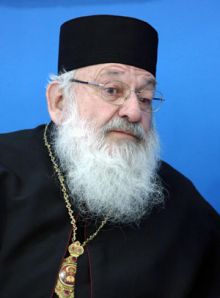The Day reported that in Lviv the year 2012 was declared to be the Year of the Patriarch of the Ukrainian Greek Catholic Church Josyf Slipyj (13.02.1892–7.09.1984). A series of commemorative events has been already held, including public meeting with like-minded successor of the Patriarch Slipyj former head of the UGCC His Beatitude Liubomyr Huzar, which was organized by the International Institute of Education, Culture and Diaspora Relations at the National University Lviv Polytechnic. His Beatitude stressed that the activities of Slipyj were multifaceted, thus, he drew attention of the audience that filled the assembly hall to the three aspects of Patriarch’s life: serving science, pastoral work, and the efforts of Slipyj to unite the UGCC. “This is a matter for reflection so that each of us could stop and think how he can be useful for his people and his church,” said Huzar.
“Josyf Slipyj was a man gifted from God, he had talent for scientific work. He is one of very few theologians whom writers quote. And he considered the great challenge of his life not only to work in academic sphere but also to teach lots of other people to love science.
“His pastoral work was in that he suffered for his people. This was his way of serving.
“Our Greek Catholic Church due to many various reasons exists not only on the territory of Ukraine but also in other parts of the world. His Beatitude Patriarch Slipyj devoted the last 20 years of his life to establishing and preserving the unity of our Church, unity of people, who are sons of their people and their church.”
Huzar also noted that in the situation when there was no Ukrainian state as such, in exile Slipyj opened the real Ukraine and its history to the world. The proof of that is establishing the Ukrainian Center in Rome, opening Ukrainian Catholic University and its branches in Washington, Philadelphia, Chicago, and London, St. Sophia Cathedral, restoration of the Ukrainian Free University in Munich, and also establishing the Society of Saint Sophia in Genk (Belgium). The highest national idea of Slipyj was consent and unity of all Ukrainians – both in Ukraine and outside the country – for developing the state and Church. The main goal was preservation and strengthening of Ukrainian national identity of Ukrainian people living abroad through opening cultural and spiritual centers in the areas with largest Ukrainian communities.







